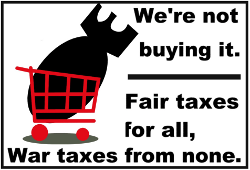Ed Agro sent an email to the wtr-s list about how to revitalize the war tax resistance movement and expand its influence in American activism in these days of the obamastupification of anti-war liberals.
It seems to me that our trouble is largely the same two problems the anti-war movement has had all along:
- there aren’t enough people who understand that the government’s aggressive militarism is a problem, and
- the people who do understand this typically don’t see it as something urgent that they personally ought to do something about — they’re content to have the correct opinion on the matter, and express that opinion at greater or lesser volume, and hope that posterity records their righteousness
The anti-war movement, such as it is, has helped to perpetuate U.S. militarism by largely restricting its activities to encouraging problem #2 people to complain and protest and propagandize and raise a fuss in the hopes of getting more problem #1 people to become problem #2 people.
Thing is, a lot of potentially sympathetic problem #1 people look at the problem #2 people and think: if these folks really believed their own propaganda, they wouldn’t just be holding parades and putting bumper stickers on their cars. Looks to me like they’re just opinionated self-righteous loudmouths trying to recruit people into their no-fun club.
The problem #2 folks ought to address problem #2 head on, as each one of them is immediately empowered to do. Problem #1 will solve itself as people notice anti-militarists starting to take themselves seriously.
The war tax resistance movement offers one way for problem #2 folks to do this — to “put their money where their mouths are” and to treat their own concerns with the urgent seriousness they deserve.
Agro makes a second point, which I’ve alluded to here in the past as well:
A problem: The way things are going, many of the target audiences, which would otherwise be sympathetic to WTR, will probably have little or no tax liability. In fact people will be relying on the government to help them through tough times. Will someone soon have to write a how-to article on “WTR in a time of no taxes”?
The last several years have seen large percentages of the U.S. population made essentially immune from the personal federal income tax. Last I checked, only about three in five Americans paid any personal federal income tax, and nothing about the Obama administration’s current tax plans gives any indication of reversing this trend.
Most of the focus of the American war tax resistance movement has been on the personal federal income tax and on the telephone excise tax. The phone tax is also hitting fewer people now, as now it only applies to local service on land-lines.
It’s something we’re going to have to give some thought to: how we can retool our movement for today’s tax environment.


